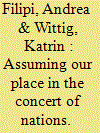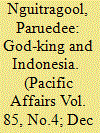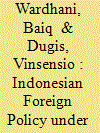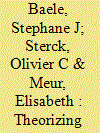|
|
|
Sort Order |
|
|
|
Items / Page
|
|
|
|
|
|
|
| Srl | Item |
| 1 |
ID:
186319


|
|
|
|
|
| Summary/Abstract |
Pierre Nkurunziza died in 2020, just a few months short of completing his tenure as the first post-civil war President of Burundi. Critics have cast him as yet another rebel-turned-politician who came to office on a promise of a democratic transformation but became progressively authoritarian, particularly during his third, disputed term in office. As a political figure, however, Nkurunziza remains poorly understood. What kind of a worldview motivated his politics? Drawing on critical discourse analysis, we identify three recurring themes in Nkurunziza's key political speeches: anti-colonialism; unity and self-sufficiency; and discourse around ‘politics of a new beginning’. These themes were stable across time, indicating Nkurunziza's consistent worldview, but became more pronounced and radical as he faced growing challenges to his legitimacy from within and without. Far from being confined to rhetoric, the themes also manifested in concrete policy decisions, underscoring the urgent need to take ideology seriously in understanding the political trajectories of African leaders.
|
|
|
|
|
|
|
|
|
|
|
|
|
|
|
|
| 2 |
ID:
118991


|
|
|
|
|
| Publication |
2012.
|
| Summary/Abstract |
The critique of Western-centrism in knowledge production in the discipline of international relations (IR) has led to attempts to incorporate regional experiences into the mainstream IR theorization. Ambivalence and challenges remain, however. They arise from the similar and shared histories that make distinguishing Western and non-Western ideas and theories difficult. Seeking to contribute to the debate on Western-centrism in IR theorization, I examine the cultural sources and history of political realism in Java. By tracing the history of struggles, political practices and the ideas such as the God-King, problems of some contemporary IR theories become evident.
|
|
|
|
|
|
|
|
|
|
|
|
|
|
|
|
| 3 |
ID:
192240


|
|
|
|
|
| Summary/Abstract |
Since independence in 1945, Indonesia has managed to carry out its foreign policy according to a unique doctrine described as “independent and active” (bebas dan aktif). To be independent means that Indonesia does not side with world powers, while being active means vigorously carrying out peaceful policies and actively participating in the peaceful settlement of international issues. The doctrine is not a neutral policy but does not align and bind the country with the superpowers or any military pact. Instead, being independent and active primarily serves the national interest while allowing the Indonesian government to collaborate with other nations. However, the doctrine’s implementation has varied according to the different interpretations of successive presidents. This paper explains Indonesia’s independent and active foreign policy during President Joko Widodo’s presidency. It contends that while the doctrine has continued to underlie Indonesia’s foreign policy, the formulation of President Joko Widodo’s foreign policy is unique in its practical approach, prioritizing the national interest and the domestic advantages of foreign relations. In the president’s worldview, foreign policy has been instrumental in promoting the nation’s development.
|
|
|
|
|
|
|
|
|
|
|
|
|
|
|
|
| 4 |
ID:
145991


|
|
|
|
|
| Summary/Abstract |
While recent research has demonstrated the key role played by emotion in conflicts, the interplay between the individual and collective dimensions of this variable has not yet been fully conceptualized and satisfyingly measured. Focusing on the 2011 Palestinian statehood bid at the United Nations and the United Nations Educational, Scientific and Cultural Organization, this article highlights the circular character of group-based emotional dynamics and stresses the importance of “emotional worldviews” and “emotional configurations.” We subsequently provide an innovative, robust, and repeatable quantitative method for the direct measuring of these two components. This threefold contribution—theoretical, methodological, empirical—completes recent models (chiefly the appraisal-based framework) and unfolds new research avenues for the study of the role of individual and collective emotions in conflicts.
|
|
|
|
|
|
|
|
|
|
|
|
|
|
|
|
|
|
|
|
|